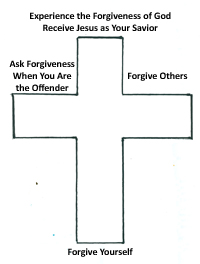 In last week’s post, we discovered the first and most important stage of Forgiveness is: Experience the Forgiveness of God by receiving Him as our Savior. Today, we are continuing our journey around The Cross to view the next stage as found in Colossians 3:13: “Remember, the Lord forgave you, so you must forgive others.
In last week’s post, we discovered the first and most important stage of Forgiveness is: Experience the Forgiveness of God by receiving Him as our Savior. Today, we are continuing our journey around The Cross to view the next stage as found in Colossians 3:13: “Remember, the Lord forgave you, so you must forgive others.
This scripture paints the picture of what we should do for those who have offended us — what Christ has done for us, “Pass It On.”
Keep in mind that forgiveness means: to let go, to release, separate, to let something alone, to leave.
 Let’s look at 4 Biblical principles that should help us understand why we should pass on forgiveness to others.
Let’s look at 4 Biblical principles that should help us understand why we should pass on forgiveness to others.
1. Recognize That We Have Been Totally Forgiven
When we get an understanding of the distance our sins had separated us from God, and recognize the sacrifice God made to restore us back to Him, then we should not hesitate to begin the process of forgiving others.
Refusing to do this is to be like The Unmerciful Servant in Matthew 18:21-35.
In this parable, a King decided to bring his accounts up-to-date. In the process, one of his servants was brought in who owed him a huge sum of money. It was impossible for this servant to pay the King, so the King ordered him sold for the debt as well as his wife, children, and everything he owned as payment.
The servant fell down before the King begging for mercy: “Please be patient with me; give me a little time.” BUT, the King was moved with compassion and gave him something more precious than time. He released him of the entire debt.
The story doesn’t end there. Matthew 18:28-35 records the actions of the servant after he had
been set free of his debt. He met a man who owed him a smaller amount than he had owed the King, and demanded his money from him.
The man begged for mercy: “Please be patient with me and I will pay all of the debt.” BUT, he refused to give him mercy and demanded he be put in prison until he could pay the debt.
When the King heard what the servant had done, he commanded that he be turned over to the tormentors until he could pay all that he owed.
Now let’s read Luke 7:36-50 for a contrasting view. The parable begins with Simon, Jesus, and others gathered at Simon’s house for dinner.
All of a sudden, a prostitute walks in.
- She begins weeping and washes Jesus’ feet with her tears.
- She then dried his feet with her hair.
- She gave him a kiss of greeting on his feet.
- Next she covered his feet with a rare perfume.
Simon and the other people didn’t understand what was going on. Then Jesus said, “Simon, I have something I want to say to you,” and He began to tell Simon a parable of The Two Debtors.
There was a man who had loaned money to 2 debtors. He loaned one $5,000.00; the other
$500.00. Neither of them could pay him back, but he “Released” them both. Jesus asked
Simon, “Which one do you think loved his creditor the most?”
Simon answered, “I suppose the one who owed him the most.” “Correct!” Jesus said. Then Jesus said to Simon:
- “I came into your house and you didn’t offer me water to wash the dirt off my feet, but she washed my feet with her tears and dried them with her hair.
- You refused to give me the customary kiss of greeting, but she kissed my feet again and again from the time she came in.
- You neglected the usual courtesy of olive oil to anoint my head, but she covered my feet with rare perfume.
- “Wherefore, her sins (and they are many) are forgiven for she loved me much; but one who is forgiven little shows little love. (Luke 7:47)
What points can be drawn from comparing these two parables?
- The unmerciful servant (Matt. 18-21-35)
• He did not recognize he had been totally forgiven of his debt, therefore he could not pass on mercy and forgiveness to others.
• The results: He was turned over to the tormentors (vs. 34) - The Two Debtors (Luke 7:36-50)
• The prostitute recognized just how much she had been forgiven, therefore, she showed much love. (vs. 47)
• The results: Jesus said to the woman: “Go in peace.” (vs. 50)
It appears that:
- Our ability to extend mercy and forgiveness to others is directly related to the degree by which we recognize our debt of sin has been totally cancelled.
- We will then replace the anger and hate in our hearts with love and peace toward all who have hurt us, thereby freeing us from the torment of unforgiveness.
2. Remove the Log From Our Own Eyes
Another basic truth that should enable us to forgive others more quickly is found in Matthew 7:3:
“Take the log out of our own eyes in order to deal with the speck in other’s lives.”
The story of David and his adulterous affair with Bathsheba gives us an example of this concept. Bathsheba became pregnant as a result of the affair, and David then had her husband killed so he could marry her. The baby was born, and David went on with his life as if nothing had happened.
God sent Nathan, the prophet, to confront David. Nathan used an illustration of two men who owned sheep: one was very rich, owning many sheep; the other was poor, owning nothing but one little lamb. When a guest came to the rich man’s home, instead of killing a lamb from his own flocks for food, he stole the poor man’s one lamb and killed it to feed his guest.
Outraged at this situation, David responded: “Any man who would do like that should be put to death; he shall repay four lambs to the poor man for the one he stole, for having no pity.”
Nathan replied, “David, you are the man!”
David had quickly seen the speck in another’s life, but had failed to recognize the log in his own. (2 Sam. 11)
3. Forgive Others Just the Way They Are
Are you in close contact with someone who “rubs you the wrong way?” To be more specific, “do you find that these people agitate you to the point that you are offended by them?”
Romans 15:7 says:
“Receive (accept) one another, as Christ also received us to the glory of God.”
The reality of this scripture is: “sometimes, we just have to accept and forgive others just the way they are: their very nature.”
In Romans 14:1-4, Paul is writing because there were people in the church who were arguing over certain things they believed were right to eat or not to eat. Finally he said in verse 5: “Let every man be fully persuaded in your own mind.”
In essence he was saying to have a little more patience; decide where your faith lies, then be fully persuaded in your own mind what you believe. Paul dealt with division. He didn’t want to kick them out of church, so he dealt with them with love and acceptance.
Did God wait for you to get perfect before He forgave you?
4. Forgive Others For Not Meeting Your Needs
Do you designate certain people to meet the needs you have in your life?
Philippines 4:19 says:
“My God shall supply all my needs, according to his riches in Glory.”
Our natural tendency is to look for our needs to be met within our own family, close friends, or even certain church members. However, the truth of Philippines 4:19 is that it does not designate any certain person. It just says, “God shall supply the need, without saying who the vessel will be that He will use.
I personally call this Misplaced Expectations. It is my belief that we have placed “expectations” on certain people in our life. If they do not follow through with our expectations of them, then we hold a grudge against them, opening the door for unforgiveness to come into our heart.
My friends, as someone recently said to me, “this stuff is hard.” Indeed, it can be hard when you have been very badly wounded. But, I trust today that the seeds of “why” we should forgive others has been planted.
Join Hannah and me next week for Wrong Ideas, Misconceptions, and Hang-ups we have about Forgiveness.
Meanwhile, if you have questions, leave me a comment and I will do my best to find out the
answer for you. I have experienced torture from an unforgiving heart; I wish that on no one.










Thank you for doing this series. I am struggling with forgiveness right now, but I am getting there. Lots of elements to this subject, which is why I think I struggle with it so much. I will explain further when you get into misconceptions.
Yes Lynette, there are a lot of elements to this subject, and a lot of wrong ideas as to what it means. Hopefully I can clear some of these up next week. Do you have any specific question? I will do my best to try to find the answer.
This may stir a hornets nest, but I have read a lot about forgiveness requires repentance. Some agree, some don’t. I know that God doesn’t forgive us without repentance. I’m not using this as an excuse to not forgive, but would be interested in what you think. While I understand that Jesus said ‘forgive them for they know not what they do’ while he was being crucified….I believe He was saying it in the context they didn’t realize what they were doing. Sometimes people know EXACTLY what they are doing is wrong. Are we required to forgive them without them repenting?
This is an interesting question. I personally see no where in the Bible that exempts forgiving others. Repentance, reconciliation, trust, etc are entirely different aspects that must be considered. I hope to explain all of that in detail next week. Stay with me.
Thanks Martha. I needed this message today.
Stay with us,Brenda, as we take another plunge into this subject next week. Email me personally if I can help you in any way, or just talk it out. Love to you.
Pingback: Forgiving Others: Misconceptions, Hang-ups, Stumbling Blocks - Part 1 | Martha's Blog